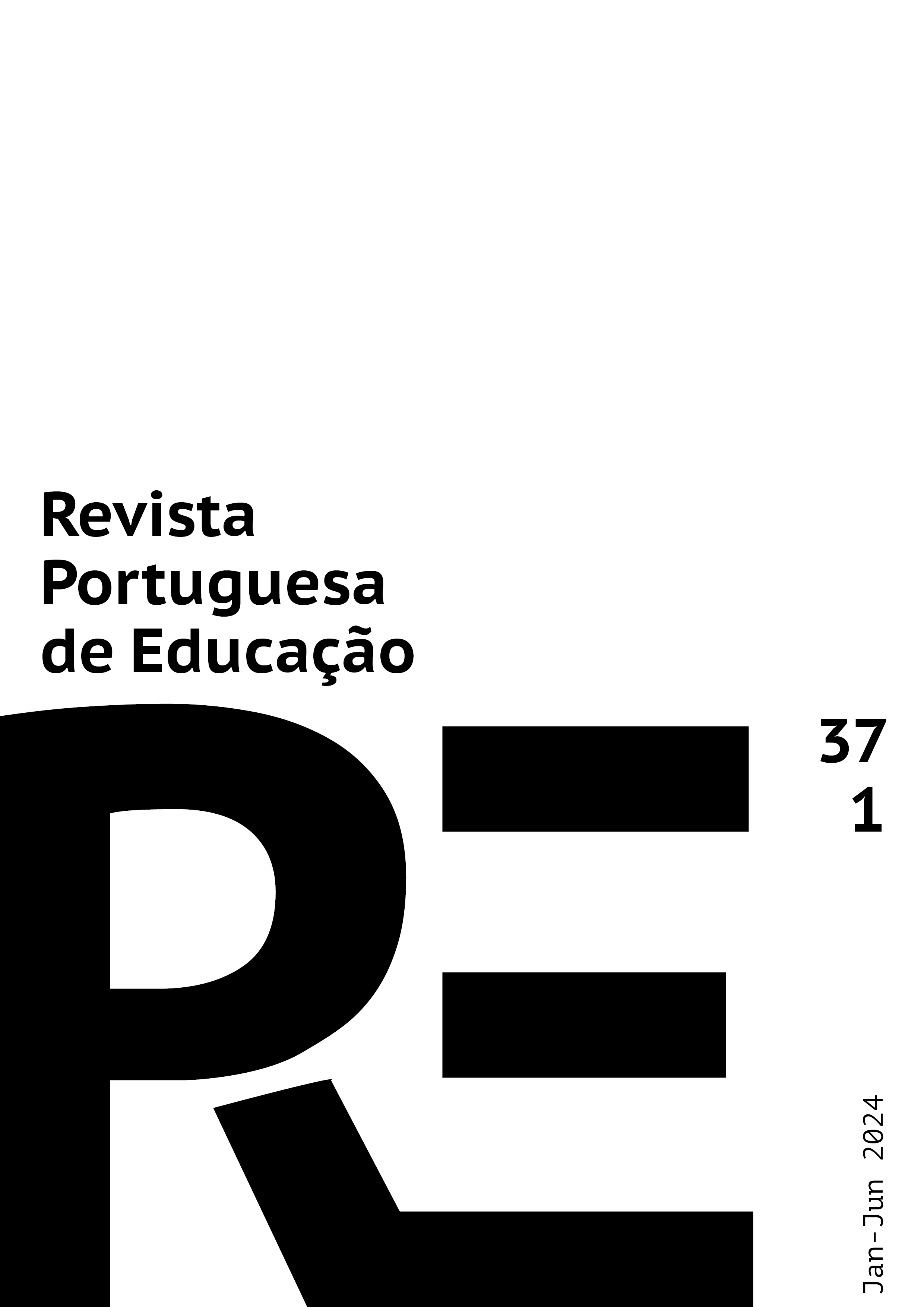Developing teaching within the academic profession: Possibilities arising from training in pedagogy in higher education
DOI:
https://doi.org/10.21814/rpe.29446Keywords:
Pedagogy, Higher Education, Teachers, Professional Development, PortugalAbstract
This article presents a study that explores the effects of the pedagogical training of higher education teachers. The challenges faced today by academic staff and teaching within higher education are taken into account, namely those that result either from the expansion and diversification of the student population or changes in curriculum design and pedagogical practices associated with the Bologna Process. Based on the analysis of a set of portfolios produced by 14 Portuguese professors within the framework of a postgraduate degree in pedagogy in higher education, we explore their motivations for training, the relationship they establish with teaching and the echoes of training in the respective exercise of the academic profession, as well as the (re)configuration of their understandings about the purposes and contents of higher education. We conclude by highlighting possible contributions of pedagogical training for valuing teaching academic work and reinforcing teachers’ autonomy, in parallel with the centrality of the respective collective dimensions. These elements, as a whole, open possibilities to consider the effects of pedagogical training in balancing the tension between research and teaching and in assuming the academic profession as a public good.
Downloads
References
Almeida, M., Viana, J., & Alves, M. G. (2022). Exploring teaching conceptions and practices: A qualitative study with higher education teachers in Portugal. Studia Paedagogica, 27(2), 35-54. https://doi.org/10.5817/SP2022-2-2
Alves, M. G. (2020). A (in)visibilidade do trabalho docente dos académicos. Revista Techniques, Methodologies and Quality, (Número Especial – Processo de Bolonha), 57-68. https://publicacoes.riqual.org/edesp1-20-57-68/
Alves, M. G., & Tomlinson, M. (2021). The changing value of higher education in England and Portugal: Massification, marketization and public good. European Educational Research Journal, 20(2), 176-192. https://doi.org/10.1177/1474904120967574
Borelli, D., Gavrila, M., Stazio, M., & Spanó, E. (2019). Another university is possible: Towards an idea of meridian university. Italian Journal of Sociology of Education, 11(3), 16-39. https://doi.org/10.14658/PUPJ-IJSE-2019-3-2
Carvalho, T., & Santiago, R. (Eds.) (2015). Professionalism, managerialism and reform in higher education and health services: The European welfare state and the rise of the knowledge society. Palgrave Macmillan.
Cochran-Smith, M., Grudnoff, L., Orland-Barak, L., & Smith, K. (2020). Educating teacher educators: International perspectives. The New Educator, 16(1), 5-24. https://doi.org/10.1080/1547688X.2019.1670309
Daddow, A. (2016). Curricula and pedagogic potentials when educating diverse students in higher education: Students’ Funds of Knowledge as a bridge to disciplinary learning. Teaching in Higher Education, 21(7), 741-758. https://doi.org/10.1080/13562517.2016.1183619
Daniels, J. (2017). Professional learning in higher education: Making good practice relevant. International Journal for Academic Development, 22(2), 170-181. https://doi.org/10.1080/1360144X.2016.1261352
Deem, R. (2021). How are university teaching, students and academic staff affected by policy clusters? A case study of England, UK, 2010-2020. In I. Huet, T. Pessoa, & F. Murta (Eds.), Excellence in teaching and learning in higher education: Institutional policies, research and practices in Europe (pp. 21-55). Imprensa da Universidade de Coimbra. https://doi.org/10.14195/978-989-26-2134-0
Entwistle, N. J., & Peterson, E. R. (2004). Conceptions of learning and knowledge in higher education: Relationships with study behaviour and influences of learning environments. International Journal of Educational Research, 41(6), 407-428. https://doi.org/10.1016/j.ijer.2005.08.009
Inamorato dos Santos, A., Gausas, S., Mackeviciute, R., Jotautyte, A., & Martinaitis, Z. (2019). Innovating professional development in higher education: An analysis of practices. Publications Office of the European Union.
Kwiek, M. (2019). Changing European academics: A comparative study of social stratification, work patterns and research productivity. Routledge.
Masschelein, J., & Simons, M. (2018). The university as pedagogical form: Public study, responsibility, mondialisation. In S. Ramaekers & N. Hodgson (Eds.), Past, present and future possibilities of philosophy and history of education: Finding space and time for research (pp. 47-61). Springer.
Nóvoa, A., & Amante, L. (2015). A la búsqueda de la libertad: La pedagogia universitaria de nuestro tiempo. REDU: Revista de Docencia Universitaria, 13(1), 21-34. https://doi.org/10.4995/redu.2015.6441
Ó, J. R. (2019). Fazer a Mão: Por uma escrita inventiva na universidade. Edições do Saguão.
Sachs, J. (2016). Teacher professionalism: Why are we still talking about it? Teachers and Teaching, 22(4), 413-425. https://doi.org/10.1080/13540602.2015.1082732
Sluis, H., & Huet, I. (2021). Providing opportunities for professional learning: A sketch of professional development in the UK. In I. Huet, T. Pessoa, & F. Murta (Eds.), Excellence in teaching and learning in higher education: Institutional policies, research and practices in Europe (pp. 129-151). Imprensa da Universidade de Coimbra. https://doi.org/10.14195/978-989-26-2134-0
Teichler, U. (2017). Teaching versus research: An endangered balance? In M. L. Machado-Taylor, V. M. Soares, & U. Teichler (Eds.), Challenges and options: The academic profession in Europe (pp. 11-28). Springer.
Trindade, R. (2010). O ensino superior como espaço de formação: Do paradigma pedagógico da aprendizagem ao paradigma da comunicação. In C. Leite (Org.), Sentidos da pedagogia no ensino superior (pp. 75-98). Livpsic.
Downloads
Published
How to Cite
Issue
Section
License
Copyright (c) 2024 Mariana Gaio Alves, Teresa N. R. Gonçalves

This work is licensed under a Creative Commons Attribution-ShareAlike 4.0 International License.
1. The authors preserve their authorship and grant the Portuguese Journal of Education the right to the first publication. The work is licensed under Creative Commons Attribution License that allows sharing the work with the acknowledgment of initial authorship and publication in this Journal.
2. The authors have the right to take additional contracts separately, for non-exclusive distribution of the published version of their work (e.g. to deposit in an institutional repository or as a book chapter), acknowledging the initial authorship and publication in this Journal.
3. The authors have the permission and are stimulated to post their work online (e.g. in an institutional repository or on their personal website). They can do this at any phase of the editorial process, as it may generate productive changes, as well as increase impact and article citation (see The Open Citation Project).
The work is licensed under Attribution-ShareAlike 4.0 International (CC BY-SA 4.0)




















